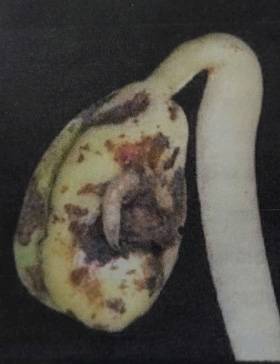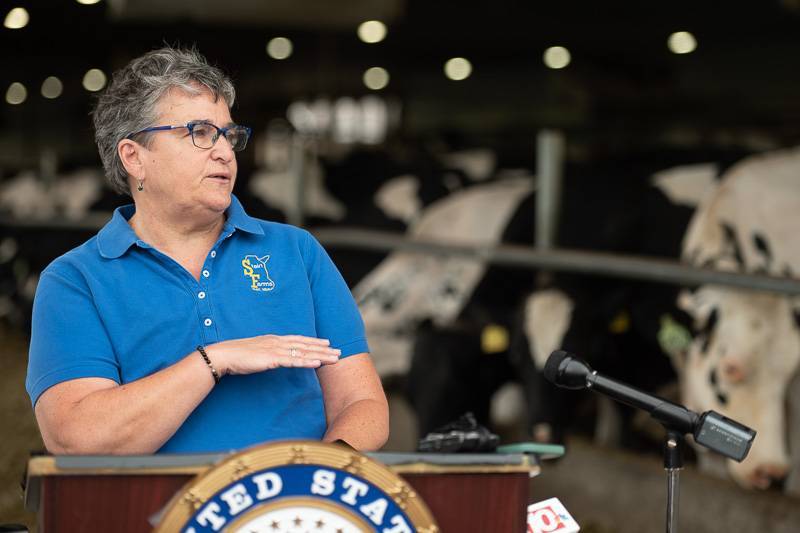Protecting birds and bees shouldn't have to cost farmers, consumers: local farmer speaks up

The Birds and Bees Protection Act is a seemingly simple enough and all-natural sounding title that most anyone would be for it, wouldn’t they?
Well, not everyone. Shelley Stein, CEO of Stein Farms in Le Roy, said she had to speak up as a farmer and "a person who understands the ramifications of policy on our farmers, and our consumers, and what this is going to mean to the economy of Genesee County."
Stein has stood up against the act, now approved by the state Senate and Assembly and is awaiting signature by Gov. Kathy Hochul.
What it is
The county legislature chairwoman has her work cut out for her, not only going against a bill meant to protect nature’s precious wildlife, but also against a purported expert extolling the virtues of a Cornell University study to back up the move to prohibit the “sale, distribution or purchase by any person within the state of corn, soybean or wheat seeds coated or treated with pesticides with the active ingredients clothianidin, imidacloprid, thiamethoxam, dinotefuran, or acetamiprid,” as of Jan. 1, 2027.
In the simplest layman’s terms, Stein’s position is for coating the seeds in the ground with chemicals to kill maggots that wreak havoc with the crops and allow farmers to continue with their current soil management practices that encourage earthworm activity. Once the crop emerges from the ground, she says, the chemical does not harm the birds and bees in the air waiting to pollinate and feed.
If they did not treat the seeds and maggots were allowed to grow, farmers would have to more aggressively till the soil, destroying the earthworms and related best soil management practices they’ve had in place, she said, and more pesticides would potentially be used in the air to save the crops.
What does all this mean for the end result — the crop and the consumer? Potentially less harvest and more expensive produce.
Stein wrote a rebuttal to the "Times Union" after it endorsed the act and urged the governor’s approval.
Why it's important for NYS and specifically Genesee County

"New York farmers have only one shot each year to grow a crop of corn or soybeans, and waiting under the soil are insects like the seed corn maggot that love to gobble up seedlings before they emerge," she said in her opinion piece. "Coating minute amounts of neonic pesticides on corn and soybean seeds is a proven practice to keep the maggots away and assure a successful crop — but legislation passed this year would take this tool out of New York farmers’ toolbox."
Things to consider with this bill: it’s being touted as a “first-in-the-nation” measure, one that hasn’t passed in any other state. Why is that? Stein believes she has at least part of the answer. And it isn’t that the other 49 other states have less knowledge about “neonics” being used on the crop seeds. The same senator who was involved with this measure on the West Coast is now leading the charge in the East.
"It's an important topic for farmers in New York State to win because we're the only state that these neonics will be taken away from in the U.S.," she said. "And I will just say this, it's really an alluring title of this bill. You know, Saving the Birds and Bees Protection Act. Yeah. Everybody would say well, that's a great idea. Sure, a really great idea. And we believe, as farmers and as an agricultural community, that we can absolutely do that and still be able to mitigate losses of crops and do this to the seed corn maggot. And it's the same maggot that takes its bite out of soybeans as well.
"And so this is the senator who brought this forward; he represents a portion out of Manhattan. And I believe that he thinks, according to the title, I think he thinks it's a great idea. He doesn't have any committee assignments that have to do with food and agriculture. And when the Natural Resources Defense Council tried to do the same thing in California, California got wise and they turned him down. And so he becomes this champion, even though his district doesn't grow any corn or soybeans."
Background study #1
What about that in-depth Cornell University study that showed no economic benefits to users or provided safer, effective alternatives rather than the neonic coatings (pesticides) on corn, soybean and wheat seeds?
This assessment is based on averages, Stein said, and not on individual farm risk assessments.
"A catastrophic loss on one farm means everything to that farm business, yet statistically, it gets lost in the shuffle when averaged over all farms," she said.
She used her own dairy farm as an example of items to be assessed, and that cannot be "averaged away" with risk factors "and expect to have sufficient feed for my herd."
Those considerations include relative seed corn maggot threat level in each of her fields, the date of planting and field soil temperatures, and the market price of feed -- corn grain and silage, and soybean meal -- to replace potential loss of crops.
Who's involved
There is quite a list of advocates for the ban, including the Sierra Club, the Northeast Organic Farming Association of New York, Environmental Advocates of New York, Clean + Healthy, the New York League of Conservation Voters, National Audubon Society, the Bee Conservancy and Physicians for Social Responsibility of New York.
New York beekeepers claim they have lost more than 40 percent of their bee colonies largely due to neonic pesticides. The bill’s sponsor, Senator Brad Holman-Sigal, represents the 47th district in Manhattan and is a staunch supporter of banning the seed pesticide use in a string of platforms he has run on and endorsed for rights pertaining to the environment, civil liberties, LGBTQ, child victims, housing, transportation, public education and seniors.
The New York Farm Bureau has led a coalition of opponents in urging lawmakers to reject the bird and bees proposal, as it is counter to New York's sustainability goals within the New York Climate Action Council and will force farmers to use less environmentally friendly means of pest control, as Stein said, including increased tillage and airborne pesticides.
Treating the seeds, however, is environmentally superior to aggressively tilling the soil -- making more trips across the field -- to destroy maggot habitats, Stein said, which requires fossil fuels and releases carbon to the atmosphere. Best soil management practices "help make soil more fertile, more robust, if you allow earthworms to do their jobs," she said.
Pollinator experts have also identified other issues impacting pollinators, she said, such as bee parasites, malnutrition, declining habitat and diseases, "that are far more significant than judicious pesticide use."
Background study #2
Stein also pointed out that there is another Cornell study that has been ignored by politicians. The first one was done "only on economics, and it used averages. The second study that was done by Elson Shields, who's an entomologist, so he's the Bug Guy ... it is the study that's actually practical in the field," she said.
That field study, related to the seed corn maggot, corn crop and economic viability of using untreated seeds, was performed in 2021.
Research data collected in controlled studies during 2021 at the Cornell Musgrave Farm located in Aurora showed that in corn production following a cover crop, seed corn maggot economically damaged 54 percent of the non-insecticide seed-treated plots ranging from 11 to 62 percent stand losses.
These losses would be economically devastating to a farmer, where the farm loses yield on 54 percent of their acreage, ranging from $40 to $400 per acre. Since predicting which fields will be attacked by seed corn maggot prior to planting is difficult and imprecise, the prevention of yield losses ranging from $40 to $400 per acre on a third of the acreage "easily compensates and is economically justified for the $5 per acre cost of the insecticide seed treatment for all acres," the study stated.
"Given that conservation practices such as reduced tillage and planting cover crops to reduce erosion and runoff are not only encouraged but also incentivized in New York State, it is important to understand that in the absence of these seed protectants, farmers may revert to planting fewer cover crops to avoid losses to seed corn maggot," it stated.
Go HERE for the full study.
Final word
The Batavian asked Stein if politicians -- Gov. Kathy Hochul at this point in time -- are equipped to be making this type of decision for farmers and those that depend on them.
"The (Environmental Protection Agency) allows this practice in every other state in the nation, except for the actions of New York State, and there are those that would tell you that New York State doesn't want any agriculture anymore on our lands, which doesn't make any sense, because agriculture is New York State's number one industry as far as the economy goes, and land use goes. There's a push for high-quality local affordable food. This bill takes that away from us as well," Stein said. "Do I believe that Governor Hochul is well equipped to be making this final vote? Here's what I know. The governor represented our area as a congressperson. She is well aware of what our economy in the center of the state is based on. And she knows the negative impacts of the policies of the Democratic Party and the toll that it's taken on agriculture. I find it hard to believe that she would put one more nail in our coffin."
